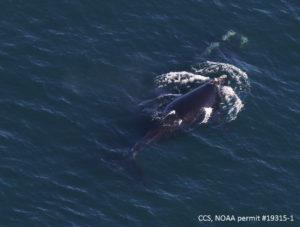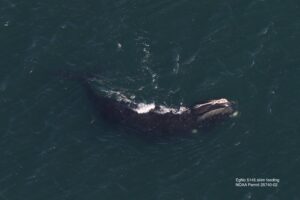
Caption: Right whale #3520, Millipede, photographed in Cape Cod Bay with her 2021 calf by the Center for Coastal Studies Right Whale Aerial Survey team on 3/3/21. CCS, NOAA permit #19315-1
HYANNIS – New federal regulations meant to protect endangered North Atlantic right whales are set to be instituted soon.
But they’re facing opposition from the Maine Lobstermen’s Association despite endorsement by marine animal experts, and also being criticized as not stringent enough by environmentalists.
The association has filed a lawsuit against the National Marine Fisheries Service and the U.S. Secretary of Commerce over the 10-year whale protection plan.
It includes regulations like state-specific gear marks, more traps between buoy lines, more seasonal closure areas and requiring weaker ropes that the whales can break.
The whales are routine visitors to Cape Cod’s waters and bring their newborns to Cape Cod Bay annually to feed, however they only number about 360 total, according to the Centers for Coastal Studies in Provincetown.
The animals are also highly susceptible to vessel strikes and fishing gear entanglement, with the center itself having freed a whale from an entanglement in late June.
New England Aquarium’s right whale expert and Senior Scientist Amy Knowlton decried the lawsuit threatening to delay the regulations, estimated by the National Oceanic and Atmospheric Administration’s fisheries division to reduce mortality incidents by 69 percent.
“What we need to keep focused on is that the industries that are sharing the ocean with right whales and other species, we’re trying to understand how they’re impacting these species and develop ways that they can better coexist with these species,” said Knowlton.
“That’s why rope-less fishing and reducing breaking strength on ropes are two really important measures that can help address this threat as well as closures, as well as just trying to keep whales and fishing gear apart.”
The lobstermen advocacy group said that the new regulations are a “draconian” approach that will be a significant burden on small, owner-operated businesses across the region.
The New England Aquarium also previously issued a statement earlier this month saying that the new federal rules were not strict enough to prevent the extinction of North Atlantic right whales, calling for more “aggressive measures” from the government.
“In the bigger picture, we have to change several industries to be more considerate to the species and the oceans in which they operate,” said Knowlton.
As climate change and warming waters continue to drive whale populations farther north, Knowlton emphasized the importance of cross-regional—and international—approaches to research and threat mitigation, including the enforcement of regulations.
























